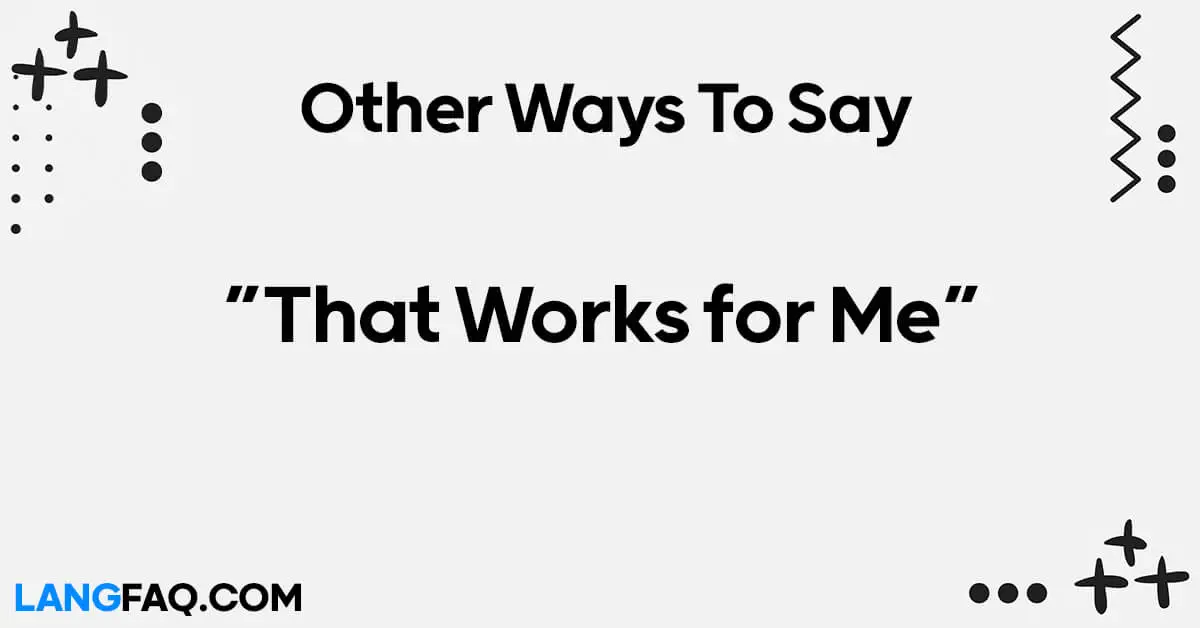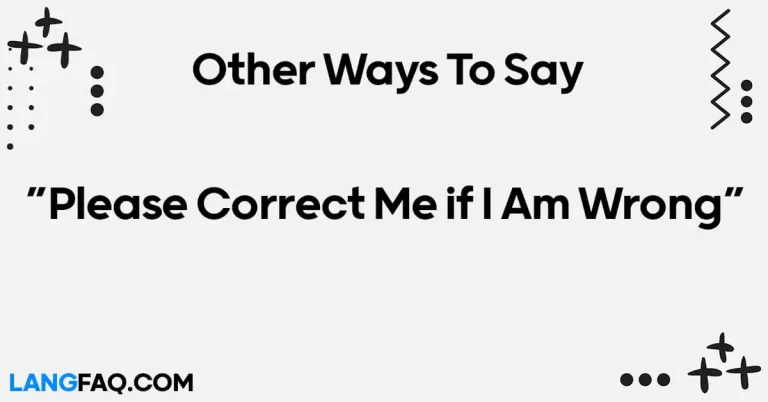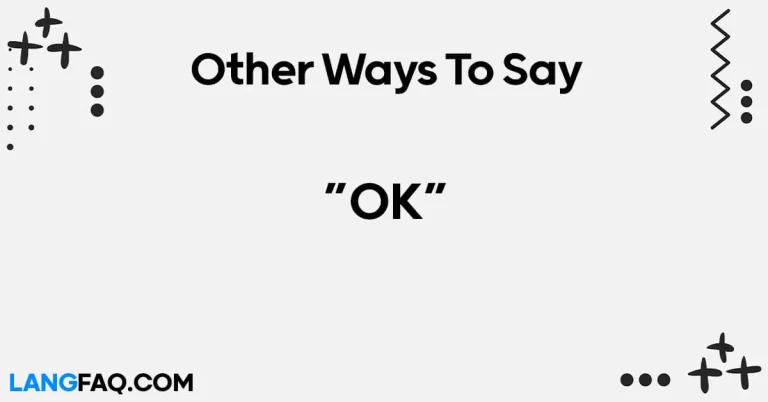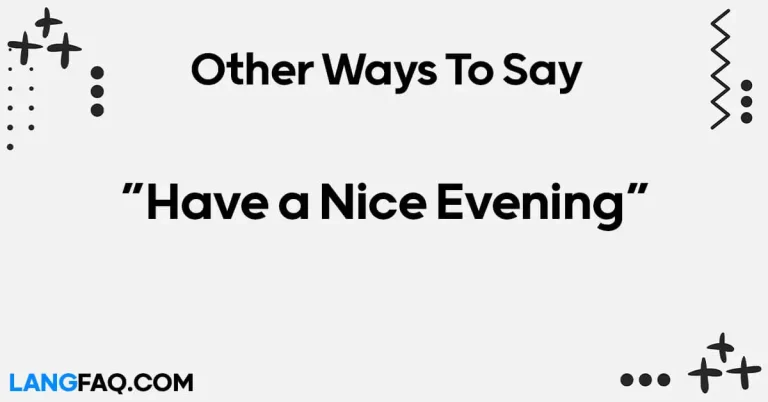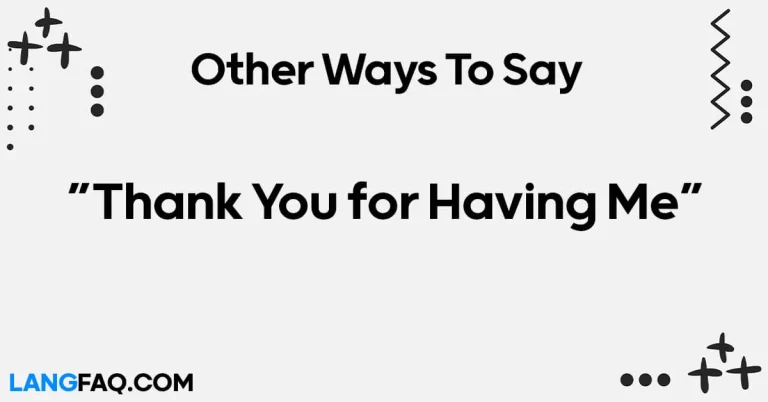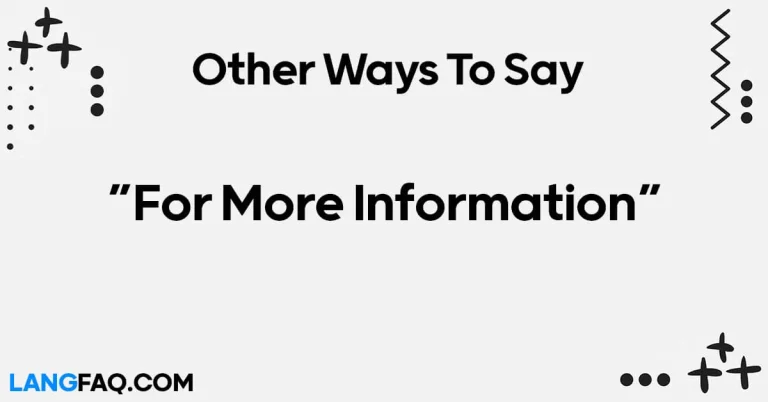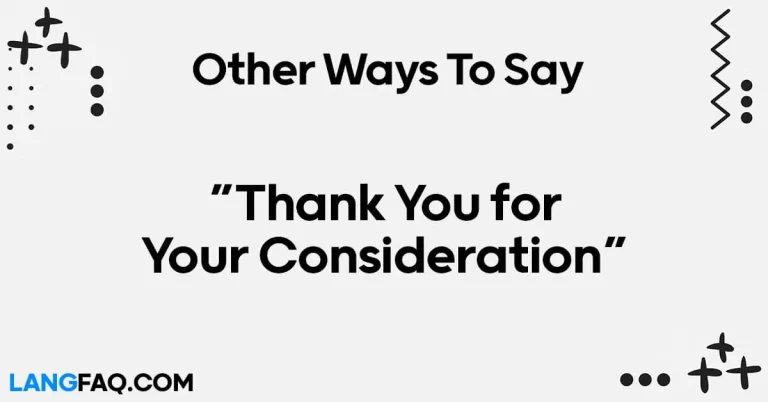In our daily interactions, finding different ways to express agreement can enhance communication and foster positive connections. This article delves into 12 unique alternatives to the common phrase “That Works for Me,” exploring the richness of language and cultural nuances in agreement.
12 Other Ways to Say “That Works for Me”
Here are 12 other ways to express “That Works for Me” in English:
- Absolutely, I’m on board.
- Sure thing, I agree.
- That suits me just fine.
- Perfect, count me in.
- I’m in favor of that.
- Sounds good to me.
- I’m on the same page.
- I’m all for it.
- Yep, that’s acceptable.
- That’s right up my alley.
- I’m supportive of that.
- No objections, it works.
| Expression | Meaning | Example |
|---|---|---|
| Absolutely, I’m on board. | Wholehearted agreement. | “Should we proceed with the plan?” “Absolutely, I’m on board.” |
| Sure thing, I agree. | Confident approval. | “Can we schedule the meeting for tomorrow?” “Sure thing, I agree.” |
| That suits me just fine. | Approval with satisfaction. | “How about a 3 pm meeting?” “That suits me just fine.” |
| Perfect, count me in. | Complete agreement and commitment. | “Need your help on this project.” “Perfect, count me in.” |
| I’m in favor of that. | Expressing support. | “Considering the proposal?” “I’m in favor of that.” |
| Sounds good to me. | Positive agreement. | “Shall we proceed as planned?” “Sounds good to me.” |
| I’m on the same page. | Mutual understanding. | “Let’s align our strategies.” “I’m on the same page.” |
| I’m all for it. | Strong support. | “Thinking of implementing the new policy?” “I’m all for it.” |
| Yep, that’s acceptable. | Informal agreement. | “Can we meet at 2 pm?” “Yep, that’s acceptable.” |
| That’s right up my alley. | Agreement due to personal interest. | “Want to join the project?” “That’s right up my alley.” |
| I’m supportive of that. | Conveying support. | “Considering the charity event?” “I’m supportive of that.” |
| No objections, it works. | Agreement without reservations. | “Changing the venue?” “No objections, it works.” |
In the vast landscape of language, there are numerous ways to express agreement, each carrying its unique nuance. These alternatives not only convey approval but also add diversity and richness to our communication, allowing for a more engaging and expressive dialogue.
Is It Correct to Say “That Works for Me”?
Yes, “That works for me” is a completely correct and commonly used expression in English. This phrase is often employed to indicate agreement or approval regarding a proposal, suggestion, or plan. It conveys that the proposed idea or arrangement is acceptable and suitable from the speaker’s perspective.
Examples:
- Colleague Interaction:
- Colleague: “Can we schedule the meeting for tomorrow?”
- You: “Sure, that works for me.”
- Casual Conversations:
- Friend: “How about we grab lunch around noon?”
- You: “Sounds good! That works for me.”
- Professional Context:
- Supervisor: “We’re thinking of shifting the project deadline. Thoughts?”
- You: “Absolutely, that works for me. It allows more time for thorough planning.”
This expression is versatile and can be used in various situations, maintaining a balance between formality and informality. It’s a concise and effective way to communicate agreement and acceptance.
Professional Mail Example With “That Works for Me”
Subject: Agreement on Revised Meeting Schedule
Dear [Recipient’s Name],
I hope this email finds you well. I wanted to discuss the proposed changes to our upcoming team meeting schedule.
After reviewing the suggested adjustments, I am in agreement, and the revised timing works well for me. I appreciate the effort to accommodate everyone’s availability while ensuring we maintain our productivity.
If there are any additional details or considerations, please feel free to share them. Otherwise, I look forward to our productive meeting under the revised schedule.
Thank you for your understanding and cooperation.
Best regards,
[Your Full Name] [Your Position] [Your Company]
Absolutely, I’m on Board
Expressing wholehearted agreement is crucial in various situations, from work collaborations to social gatherings. The phrase “Absolutely, I’m on board” is a powerful way to convey not just agreement but enthusiasm and commitment.
In professional settings, using this phrase signals your dedication to a proposed idea or plan. For instance, when discussing a project proposal with colleagues, responding with “Absolutely, I’m on board” not only communicates agreement but also assures your team of your full support.
Example Sentence: “Proposing a new strategy for the upcoming quarter. Thoughts?” “Absolutely, I’m on board. Let’s discuss the details in our next meeting.”
Variations:
- Colleague Interaction: “Absolutely, let’s collaborate on that.”
- Casual Approval: “Absolutely, sounds like a plan!”
- Mentor-Mentee Context: “Absolutely, your approach aligns with our goals.”
Email Sample: Subject: Agreement and Enthusiasm for Proposed Strategy Dear [Colleague’s Name],
I hope this email finds you well. I’ve had the chance to review the proposed strategy for the upcoming quarter, and I wanted to express my full support. Absolutely, I’m on board with the direction and look forward to collaborating further to ensure its success.
Best regards, [Your Name]
Sure Thing, I Agree
When looking for a succinct and confident way to express agreement, “Sure thing, I agree” is a go-to choice. This phrase works seamlessly in both formal and informal contexts, making it versatile for various communication scenarios.
In a professional setting, using “Sure thing, I agree” maintains a business-friendly tone while assuring your colleagues or superiors of your alignment with their perspectives. In casual conversations, it adds a friendly touch to your agreement.
Example Sentence: “Considering the proposed changes to the marketing strategy. Thoughts?” “Sure thing, I agree. It aligns with our target audience.”
Variations:
- Informal Agreement: “Sure thing, I’m on the same page.”
- Professional Setting: “Sure thing, I completely agree.”
- Friend or Colleague Interaction: “Absolutely, sure thing, I’m on board with that.”
Email Sample:
Subject: Agreement on Proposed Marketing Strategy
Dear [Recipient’s Name],
I wanted to share my thoughts on the proposed changes to the marketing strategy. Sure thing, I agree with the direction you’re taking, and I’m excited to contribute to its success.
Best, [Your Name]
That Suits Me Just Fine
Adding a touch of satisfaction to your agreement, “That suits me just fine” is a phrase that conveys not just approval but contentment with the proposed idea or plan.
In professional settings, using this phrase indicates not only agreement but a level of comfort and acceptance. It’s particularly effective when discussing schedules, plans, or tasks.
Example Sentence: “We’re considering moving the team meeting to Friday afternoons. Thoughts?” “That suits me just fine. It allows me to wrap up the week efficiently.”
Variations:
- Colleague Interaction: “That suits me perfectly.”
- Informal Approval: “Yep, that suits me just fine.”
- Mentor-Mentee Context: “That schedule suits my workflow.”
Email Sample:
Subject: Agreement on Proposed Meeting Schedule
Hi [Recipient’s Name],
I wanted to share my thoughts on moving the team meeting to Friday afternoons. That suits me just fine, and I believe it’ll enhance our efficiency. Looking forward to the positive impact.
Best regards, [Your Name]
Perfect, Count Me In
When looking for a phrase that not only expresses agreement but also commits to participation, “Perfect, count me in” is an excellent choice. This phrase is suitable for both professional and casual scenarios, indicating a willingness to be actively involved.
In a work context, using this phrase shows dedication and a proactive approach to team initiatives. For social events, it conveys enthusiasm and a positive commitment to attend.
Example Sentence: “We’re organizing a team-building event next month. Interested?” “Perfect, count me in. It sounds like a fantastic opportunity for team bonding.”
Variations:
- Colleague Interaction: “Perfect, I’m on board with that idea.”
- Casual Commitment: “Perfect, count me in for the weekend plans.”
- Mentor-Mentee Context: “Perfect, count me in for the learning session.”
Email Sample:
Subject: Enthusiastic Participation in Team-building Event
Dear [Team],
I’m excited about the upcoming team-building event. Perfect, count me in! I believe it’s a fantastic opportunity for us to strengthen our bonds and enhance collaboration.
Looking forward to it, [Your Name]
I’m in Favor of That
Expressing support and agreement in a more formal manner, “I’m in favor of that” is a phrase that adds a touch of professionalism to your approval. It’s ideal for discussions where a more serious or formal tone is required.
In professional settings, using this phrase communicates not only agreement but a level of endorsement for the proposed idea or decision. It’s a way of expressing solidarity and alignment with organizational goals.
Example Sentence: “The board is considering implementing a new policy. Thoughts?” “I’m in favor of that. It aligns with our long-term objectives.”
Variations:
- Colleague Interaction: “I’m fully in favor of your proposal.”
- Formal Approval: “I’m in favor of proceeding with the plan.”
- Mentor-Mentee Context: “I’m in favor of your approach to problem-solving.”
Email Sample:
Subject: Full Support and Favor for Proposed Policy
Dear [Recipient’s Name],
I wanted to express my thoughts on the proposed policy change. I’m in favor of that and believe it aligns seamlessly with our organization’s long-term objectives.
Best regards, [Your Name]
Sounds Good to Me
When seeking a simple yet effective way to express positive agreement, “Sounds good to me” is a versatile phrase suitable for various contexts. It strikes a balance between being casual and maintaining a positive, affirming tone.
In professional settings, this phrase is particularly useful during discussions where a quick, positive response is needed. In social scenarios, it adds a friendly touch to your agreement.
Example Sentence: “Let’s finalize the project timeline. How does next week sound?” “Sounds good to me. We can meet the deadline with that schedule.”
Variations:
- Informal Agreement: “Yeah, sounds good to me.”
- Colleague Interaction: “Sounds good, let’s proceed.”
- Mentor-Mentee Context: “Sounds good to me, I appreciate your guidance.”
Email Sample:
Subject: Agreement on Project Timeline
Hi [Recipient’s Name],
Regarding finalizing the project timeline, next week sounds good to me. I believe it provides us with ample time to meet the deadline successfully.
Best, [Your Name]
I’m on the Same Page
When emphasizing mutual understanding and alignment, “I’m on the same page” is a phrase that effectively conveys agreement while emphasizing shared perspectives. It’s suitable for both professional and casual conversations.
In work scenarios, using this phrase ensures clarity and unity within a team, indicating that everyone involved is synchronized in their understanding. In casual settings, it adds a touch of camaraderie to your agreement.
Example Sentence: “Let’s discuss the project milestones. Are we clear on the objectives?” “I’m on the same page. Let’s proceed with the detailed planning.”
Variations:
- Colleague Interaction: “I’m completely on the same page as you.”
- Informal Agreement: “Yeah, I’m on the same page with our goals.”
- Mentor-Mentee Context: “I’m on the same page as your guidance.”
Email Sample:
Subject: Clarity on Project Objectives
Dear [Team],
In our recent discussion on project milestones, I wanted to confirm that I’m on the same page regarding our objectives. Let’s proceed with detailed planning to ensure we’re aligned for success.
Best regards, [Your Name]
I’m All for It
Expressing strong and enthusiastic support, “I’m all for it” is a phrase that conveys not only agreement but a proactive endorsement of the proposed idea or plan. It’s particularly effective in situations where a high level of commitment is needed.
In professional settings, using this phrase signals not just agreement but a willingness to contribute actively. In social contexts, it communicates a positive attitude towards suggested plans.
Example Sentence: “We’re considering implementing a new project management tool. Thoughts?” “I’m all for it. It could significantly improve our efficiency.”
Variations:
- Colleague Interaction: “I’m completely all for your proposal.”
- Casual Commitment: “Sure, I’m all for the weekend getaway.”
- Mentor-Mentee Context: “I’m all for following your advice.”
Email Sample:
Subject: Enthusiastic Support for New Project Management Tool
Dear [Team],
Regarding the discussion on implementing a new project management tool, I wanted to express my thoughts. I’m all for it and believe it could significantly enhance our efficiency. Let’s explore this further.
Best, [Your Name]
Yep, That’s Acceptable
For a more informal yet positive way to express agreement, “Yep, that’s acceptable” is a versatile phrase. It’s suitable for both professional and casual contexts, maintaining a friendly tone while confirming approval.
In work scenarios, using this phrase ensures a quick and approachable response. In social situations, it adds a casual touch to your agreement without sacrificing positivity.
Example Sentence: “We’re thinking of rescheduling the team meeting. Is that acceptable?” “Yep, that’s acceptable. Let’s find a time that works for everyone.”
Variations:
- Colleague Interaction: “Yep, that’s perfectly fine with me.”
- Informal Approval: “Sure, yep, that’s acceptable.”
- Mentor-Mentee Context: “Yep, that aligns with my schedule.”
Email Sample:
Subject: Agreement on Team Meeting Rescheduling
Hi [Recipient’s Name],
Regarding the proposed rescheduling of the team meeting, yep, that’s acceptable from my end. Let’s collaborate to find a time that works for everyone.
Best, [Your Name]
That’s Right Up My Alley
When expressing agreement due to personal interest or expertise, “That’s right up my alley” is a phrase that conveys not just approval but a sense of familiarity and enthusiasm. It’s particularly effective when discussing topics or tasks that align with your strengths or preferences.
In professional contexts, using this phrase indicates not only agreement but a willingness to take an active role in tasks related to the discussed topic. In casual conversations, it adds a touch of excitement to your agreement.
Example Sentence: “We need someone to lead the presentation on the new project. Any volunteers?” “That’s right up my alley. I’ll be happy to take the lead.”
Variations:
- Colleague Interaction: “That’s right in my wheelhouse.”
- Casual Enthusiasm: “Oh, that’s totally right up my alley!”
- Mentor-Mentee Context: “That aligns perfectly with my skills. I’m ready to take on the challenge.”
Email Sample:
Subject: Eager Volunteer for Project Presentation
Dear [Team],
In response to the call for volunteers to lead the presentation on the new project, I wanted to express my interest. That’s right up my alley, and I’m eager to take on the challenge.
Best regards, [Your Name]
I’m Supportive of That
When looking for a phrase that not only expresses agreement but also emphasizes support, “I’m supportive of that” is an ideal choice. This phrase is suitable for various scenarios, from work discussions to personal commitments.
In professional settings, using this phrase not only communicates agreement but also a commitment to actively support the proposed idea or decision. In mentor-mentee relationships, it conveys encouragement and backing.
Example Sentence: “Considering implementing a mentorship program. Thoughts?” “I’m supportive of that. It can greatly benefit our team’s development.”
Variations:
- Colleague Interaction: “I’m fully supportive of your initiative.”
- Formal Support: “I’m supportive of proceeding with the plan.”
- Mentor-Mentee Context: “I’m supportive of your growth and learning journey.”
Email Sample:
Subject: Full Support for Mentorship Program
Dear [Recipient’s Name],
I wanted to share my thoughts on the proposed mentorship program. I’m supportive of that and believe it can significantly benefit our team’s development. Count me in for any support needed.
Best regards, [Your Name]
No Objections, It Works
When seeking a phrase that not only expresses agreement but also assures others that you have no reservations, “No objections, it works” is a straightforward and effective choice. It’s suitable for both professional and casual contexts, ensuring a positive response without any hesitations.
In work scenarios, using this phrase promotes a smooth decision-making process. In social situations, it conveys an easygoing attitude while confirming approval.
Example Sentence: “Considering changing the project timeline. Any concerns?” “No objections, it works for me. Let’s proceed with the updated schedule.”
Variations:
- Colleague Interaction: “No objections, it sounds like a solid plan.”
- Informal Approval: “Yeah, no objections, it works.”
- Mentor-Mentee Context: “No objections, it aligns with our goals.”
Email Sample:
Subject: Agreement on Project Timeline Changes
Hi [Recipient’s Name],
I’ve reviewed the proposed changes to the project timeline. No objections, it works for me. Let’s proceed with the updated schedule.
Best regards, [Your Name]
FAQs
Q: Can I use these alternatives in formal written communication? A: Absolutely, incorporating diverse expressions of agreement can enhance the tone of your written communication.
Q: Are regional variations suitable for international business settings? A: While some regional expressions may be informal, others like “Affirmative” can be used professionally in global contexts.
Q: How do I convey agreement in a diplomatic manner? A: Opt for formal expressions like “I concur” to maintain a diplomatic and respectful tone.
Q: Is body language universally understood for agreement? A: While some gestures are widely recognized, it’s essential to be mindful of cultural differences in interpreting non-verbal cues.
Q: Can I mix formal and informal expressions in the same conversation? A: Yes, adapting your language to the context can make your expressions of agreement more relatable.
Q: How can I remember to use these alternatives naturally? A: Practice incorporating them in your daily conversations to make them a seamless part of your language repertoire.
Conclusion
In the tapestry of communication, expressing agreement is a vibrant thread that weaves connections. By embracing the diversity of expressions explored here, you can add depth and warmth to your interactions. So, the next time you find yourself thinking, “That Works for Me,” consider the myriad ways you can convey agreement and enrich your communication.

